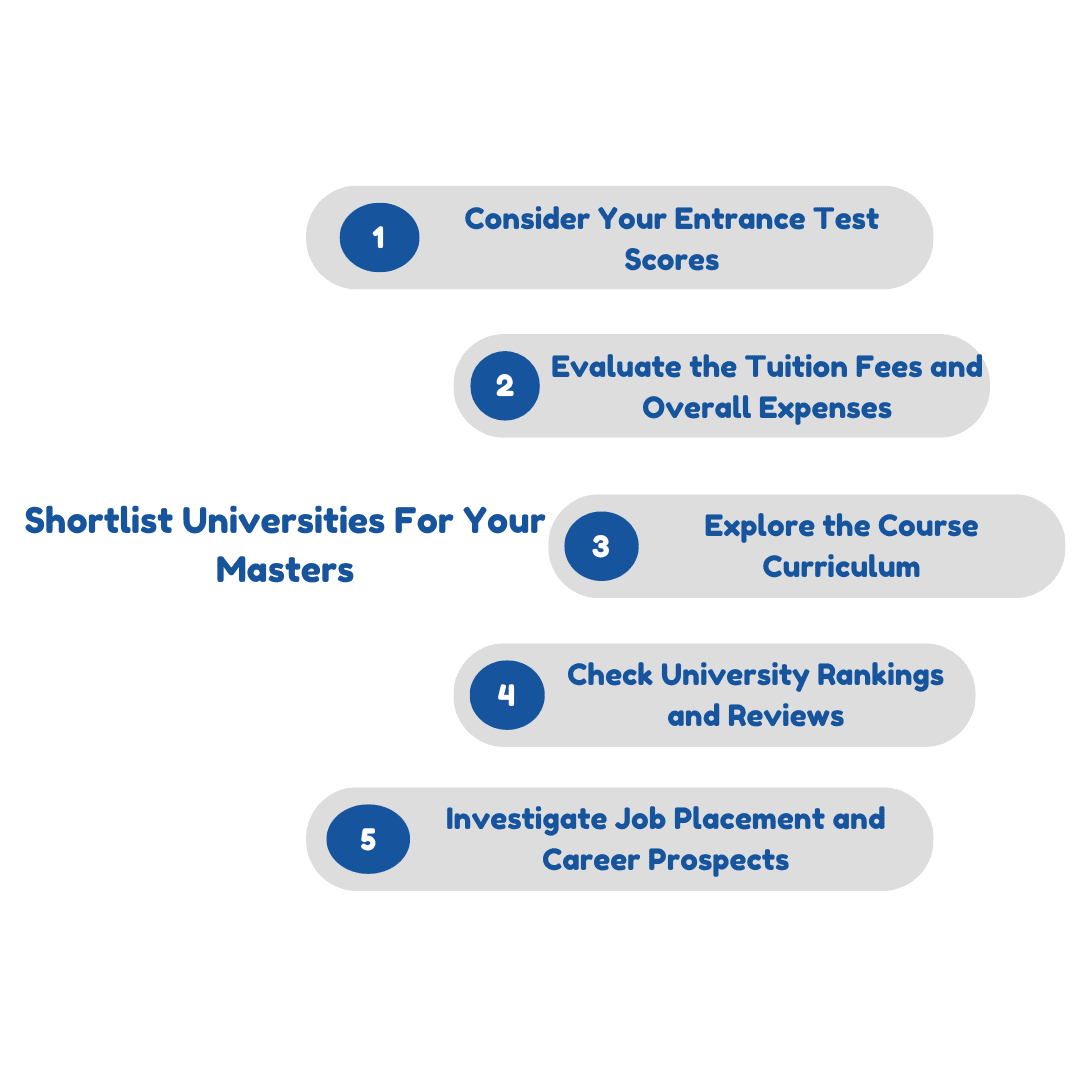Pursuing a Masters degree is an exciting and crucial step in your academic journey. However, the process of selecting the right university can be daunting. To help you make an informed decision, here's a detailed article on shortlisting the best universities for your master's program.
Check Out: University Selection in the USA (Find Out How to Select University for MS in the USA)

Consider Your Entrance Test Scores
Regarding Masters programs, universities often have specific requirements for entrance test scores, such as GRE, GMAT, TOEFL, or IELTS. Before you start your university search, check the minimum score requirements for each institution you're interested in. This will help you identify the universities that fit your academic profile well and increase your chances of getting accepted.
Evaluate the Tuition Fees and Overall Expenses
The cost of a Masters program is not limited to just the tuition fees. You must consider the overall expenses, including accommodation, living costs, and additional fees. When shortlisting universities, carefully research the total attendance cost and ensure it aligns with your financial plan. Doing this may ensure you don't face any unforeseen financial difficulties and can concentrate on your academics without worrying about money.
Also Check: Top 10 Universities for MS in Canada
Explore the Course Curriculum
As a master's student, the quality and relevance of the course curriculum are crucial. Thoroughly review each university's course material and program structure to ensure it matches your academic interests and career goals. Look for universities that provide a well-rounded education with a balance of theoretical and practical components that will equip you with the necessary knowledge and skills for your future endeavors.
Check University Rankings and Reviews
Researching the rankings and reputation of the universities you're considering is an important step in the shortlisting process. Search out universities that are well-known for their academic achievement in your field of study and have a solid reputation in the academic community. To learn more about the general quality of the university's academic atmosphere, faculty, and student experience, read reviews written by both current and past students.
|
Investigate Job Placement and Career Prospects
One of the primary reasons for pursuing a master's degree is to enhance your career prospects. When shortlisting universities, investigate their job placement records and the companies or organizations they are affiliated with. Look for institutions with a proven track record of successfully placing their graduates in relevant industry roles. This will give you a better understanding of the job opportunities and industry exposure you can expect after completing your master's program.
To help you visualize the key factors to consider, here's a detailed table outlining the importance of each criterion:
|
Criteria |
Importance |
|
Entrance Test Scores |
Very High |
|
Tuition Fees and Expenses |
High |
|
Course Curriculum |
Extremely High |
|
University Rankings and Reviews |
High |
|
Job Placement and Career Prospects |
Very High |
Remember, the process of shortlisting universities for your Masters may take time and research. Still, it's crucial to ensure you make the right decision for your academic and career goals. By considering these key factors, you'll be well on your way to finding the perfect Masters's program to help you achieve your aspirations.
Study Abroad With Studyinfocentre
FAQs
What entrance tests are required for Masters programs, and how should applicants use their scores when shortlisting universities?
Entrance tests such as GRE, GMAT, TOEFL, or IELTS are common. Applicants should check the minimum score requirements for each university to find the best fit.
What expenses beyond tuition fees should Masters students consider when shortlisting universities?
Accommodation, living costs, and additional fees should be considered to ensure financial plans align with total expenses.
How can students evaluate a university's course curriculum when shortlisting for Masters programs?
Review course material and structure to ensure alignment with academic interests and career goals.
What role do university rankings and reviews play in shortlisting Masters programs?
They help identify institutions with academic excellence and a positive reputation in the academic community.
Why is it important to research job placement records and affiliations when shortlisting Masters programs?
It provides insight into career prospects after graduation and helps students understand industry connections.
